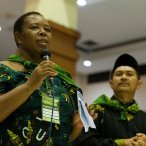
12 July 2013 | Interviews | Land grabbing | Resisting neoliberalism | Gender | Climate Justice and Energy | Food Sovereignty | 6th International Conference of La Via Campesina
Women are the Ones Who Take Care of Mother Earth
Interview with Elizabeth Mpofu, new International Coordinator of La Via Campesina
Mpofu spoke about the impact of capitalism on peasants, about the role of young people and peasant women and of climate change as one of the main challenges faced by farmers. Regarding her new role as La Via Campesina’s International Coordinator, she said she is looking forward to being a great leader to support people and that this is a great achievement in her life.
Real World Radio interviewed the Zimbabwean peasant during La Via Campesina’s (LVC) 6th International Conference held in Jakarta, Indonesia from June 9 to 13. La Via Campesina’s International Headquarters will go from Indonesia to Zimbabwe, more specifically the group called Zimbabwe Small Organic Smallholder Famers Forum (ZIMSOFF).
Mpofu joined the Association of Zimbabwe Traditional Environmental Conservationists in 1982, of which she was the secretary. In 2002, she participated in the world summit on sustainable development on behalf of the organization and she is now the chair of ZIMSOFF.
About the role of peasant women, Mpofu explained that in the past 10 years there have been a lot of changes in Africa. The Zimbabwean government realized that women should benefit from land and the agrarian reform, and that they should get land regardless of whether they’re married or not. That has been a significant progress.
Mpofu also spoke about violence against women in her country and said the Zimbabwean government is trying to address this issue. There are women in Parliament, which is a great advantage because women have representatives who defend their rights.
The peasant said some of the progress made by LVC in the recent years is its growing number of peasants at the international level and the mobilization of more women to attend international meetings and conferences.
She said the issue of land is still very challenging, since African governments are taking land away from people and giving it to transnational corporations. “We have no access to the market”, there is lots of competition, so they need support from governments to reach the markets to sell their production, and for that they need to campaign, to lobby governments.
Some of the La Via Campesina’s biggest achievements, in Mpofu’s opinion, has been the promotion of food sovereignty and the introduction of agroecology training schools.
She recognized there are still some challenges ahead, such as mobilizing young people to become more active in the movement. One of the main problems in Zimbabwe is that young people do not have enough land, so they depend on their parents’ land. This is a problem common to many countries around the world.
Finally, Mpofu mentioned climate change as one of the big challenges faced by all farmers, while she highlighted the importance of indigenous seeds and the role of women in protecting Mother Earth.
Produced by Real World Radio and La Via Campesina
Photo: Via Campesina.







